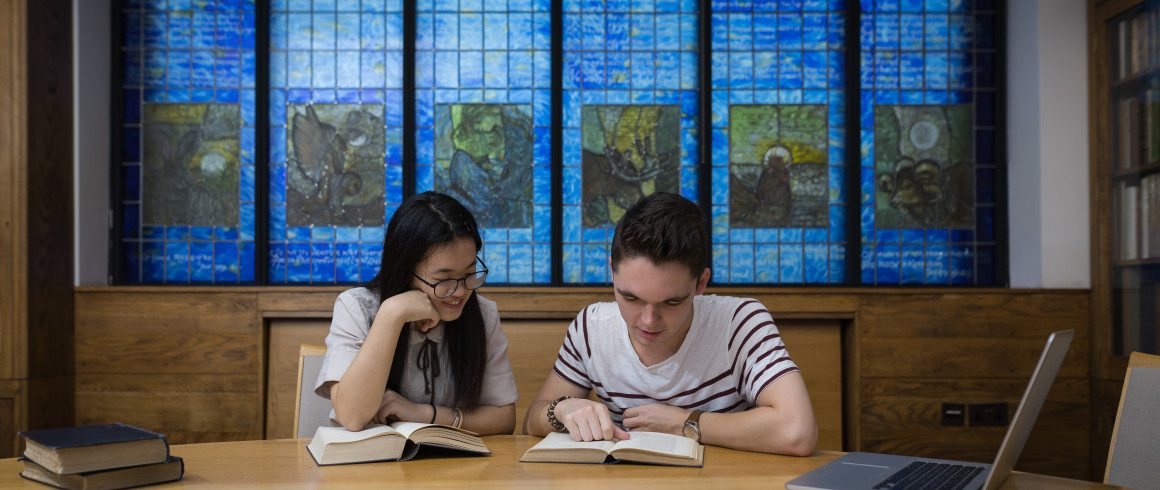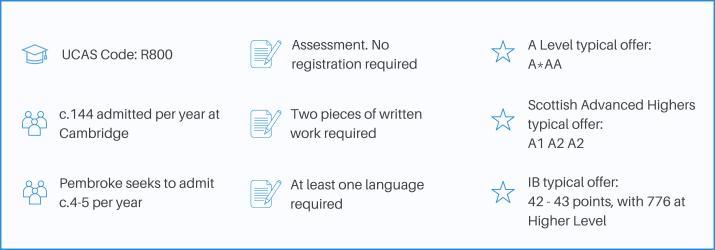Modern & Medieval Languages
Cambridge provides a wealth of choice and expertise to those wishing to learn about our world's languages, cultures, and literatures. Papers on offer range from the Middle Ages to present-day art, literature, and film. Add the option of taking a joint degree with History (HML), or taking paper options from Asian and Middle Eastern Studies (AMES), and Classics, and you have one of the most versatile and adaptable study experiences available.
Degrees with modern languages have a distinctive four-year structure centred around a third year abroad. This is the star of the show: a 12 month period when students have the unique opportunity to fully immerse themselves in the life and culture of their target country in Europe, Africa, Latin America and beyond.
The six core languages offered in the Modern Languages degree are French, Spanish, German, Italian, Portuguese and Russian. You will study two languages with the option of learning one of them from scratch (ab initio).
Modern and Medieval Languages at Pembroke
Pembroke has a lively community of modern linguists ranging from undergraduates and postgraduates to the Fellows that teach them.
The College usually admits four or five undergraduates a year to read Modern and Medieval Languages, with a further one or two taking a modern language in combination with History (HML), or with Asian and Middle Eastern Studies (AMES).
We are proud to have an in-house French lectrice and German Lektorin for weekly conversation classes and further language support, complementing the Faculty-based offering in all languages. Having a close-knit community of modern linguists in College has many advantages. In the past two years, instructors spontaneously organised lunches in Hall where students could practise language beyond the classroom; undergraduate finalists volunteered to host an event where they shared their experience of the year abroad with first- and second-year students planning theirs; and renowned international guests from Italy and Spain have been invited to College to give a talk and stay for dinner at Pembroke. The College is also very generous in supporting study-trips to target countries with Travel Grants.
You will develop near-native linguistic proficiency with the ability to analyse a variety of texts and media, build effective arguments, and navigate cultural differences with insight and diplomatic skills. These skills have a high degree of employability, and Pembroke modern linguists have successfully gone on to a wide range of careers in media, journalism, international relations, non-profits, law, finance, and the creative arts.
Pembroke's Director of Studies will guide you through the options on offer, find you the best and most relevant supervisors in College and across the University, and follow your progress. Direction of Studies and teaching are provided for all languages by the College's Fellows, introduced below.
Pembroke Modern and Medieval Languages Teaching Staff
Dr Nicolò Crisafi - Director of Studies
I am a Research and Teaching Fellow in Italian and Director of Studies in Modern Languages. I organise the studies of undergraduates in Italian, Portuguese, and Spanish and coordinate the course as a whole to guarantee the quality of everyone's experience.
My research investigates the writings of medieval poets Dante Alighieri, Iacopone da Todi, and Giovanni Boccaccio from the angle of narrative theory, affect, and reader's response. My book, Dante's Masterplot and Alternative Narratives in the 'Commedia' looks at ways of telling a life-story that do not reply on the narrative trope of growing from one's past mistakes.
I teach Italian language and literature across the four years both in College and at the Faculty (mostly on Dante, Petrarch, and Boccaccio). The courses I teach are: IT4: Autobiography and Self-Representation in Italian Culture; IT5: Italian Identities: Place, Language, and Culture; ITB1: Use of Italian; and IT7: Dante and the Culture of his Age. I am also happy to supervise relevant Year Abroad Projects.
I warmly welcome queries on modern languages at Pembroke and more generally from current and prospective students of all backgrounds, identities, and creeds.
Prof Chris Young - German
Prof Sylvia Huot - French (Emeritus)
Dr Daria Ezerova - Russian
Dr Giulia Boitani - French
Dr Lucy Foster - Spanish
Admissions
The minimum requirement is one language at A Level, Advanced Higher, or equivalent, in one of the languages that you wish to study. Ab initio courses are open to you even if you do not have a GCSE (or equivalent) in the language: you will be at no disadvantage. No other A-level, Advanced Higher or equivalent subjects are stipulated or deemed inappropriate. Applicants are very welcome in any language offered by the University.
Several of the undergraduates reading Modern Languages at Pembroke take a year off after completing school before coming up to university, and the College is very happy to receive applications for deferred entry, although understanding that it is not always possible or desirable.

